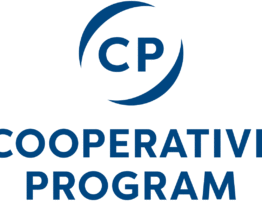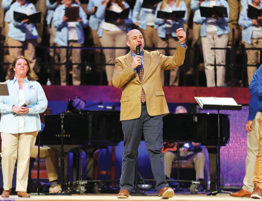 You are familiar with the story. Two mothers came before King Solomon with a baby, each claiming to be the mother. An argument ensued; accusations flew, and Solomon decided to divide the baby, thereby revealing the identity of the true mother.
You are familiar with the story. Two mothers came before King Solomon with a baby, each claiming to be the mother. An argument ensued; accusations flew, and Solomon decided to divide the baby, thereby revealing the identity of the true mother.
Somewhere along the way, the Cooperative Program became the baby many in the Southern Baptists Convention want to divide. Impatience fuels a call for drastic action. We’ve become too quick to draw the sword without considering the broader consequences. Let’s take a breath, step back, and look at the bigger picture.
I recently read a column titled “The Long, Slow Slog to a 50/50 Cooperative Program Split.” The title obviously communicates the author’s perspective and I didn’t disagree with everything he said, but as one who leads one of the state conventions mentioned in his commentary, I feel there are several facts that should have been included that would have painted a more balanced reality of state conventions, specifically Tennessee.

Randy C. Davis
First, we are not “slogging” toward a 50/50 distribution, but rather strategically moving to enable it. In the past four years, the Tennessee Baptist Convention has adopted and approved budgets that create a path in that direction with a goal of being at 50/50 in budget year 2018-2019. In Tennessee, the process has included a drawdown of staffing by 25 percent since 2011 and a willing cooperation by our state ministry partners (Adult Homes, Children’s Homes, Tennessee Baptist Foundation, Harrsion-Chilhowee Baptist Academy, and Union and Carson-Newman Universities) to significantly reduce their Cooperative Program allocations. These measures and more have allowed us to annually increase the percentage directed toward the SBC Executive Committee. We are currently on track to meet our commitment.
Despite that consistent movement, some grow impatient. The point often overlooked in drastically moving to 50/50 distribution is the collateral damage done to viable Great Commission ministries when they don’t have opportunity to adjust to decreased funding. We aren’t dealing with just an accounting function here. Remember, there are people behind those dollar signs — people serving, and people being served. Decisions that affect them should be made responsibly. Although I can’t speak for all state conventions, I can say that most state conventions are addressing similar concerns as they too move toward a 50/50 distribution.
Another issue too conveniently overlooked is general church health. Research constantly reminds us that 80 percent of our SBC churches are plateaued and declining. A significant number of those churches are in the Southeast. They are seen as the cash cow providing a majority of the funding for the totality of Southern Baptist’s Great Commission endeavors. However, the cow is sick. It is painfully obvious that the call for more giving from churches that are plateaued and declining leads to a dead end. If church health is not addressed on the most fundamental level then the wellspring of Southern Baptist missions will run dry. The state conventions along with local associations are the primary entities in the Southern Baptist Convention tasked with helping the local church. Financially undercutting state conventions impairs their ability to help, resulting in more of a decline in Cooperative Program giving which in turn will cripple — then shut down — other SBC entities.
And then there is the reality of where we are as a nation and state. In Tennessee alone we have more than 145 different global people groups now living within our borders, and more than 45 of those are identified by the International Mission Board as among the world’s most spiritually unreached. The situation is similar in other states. Throw in the rapid population growth we are experiencing and Gateway Seminary President Jeff Iorg has said that Tennessee’s spiritual demographics will look like Colorado in the next few years and California within 10.
Again, state conventions — and in our context of Tennessee — have the primary task of helping churches successfully turn back the tsunami of spiritual darkness that is about to swamp “The Buckle of the Bible Belt.”
Yes, I am in favor of a 50/50 distribution because I believe it offers Southern Baptists the best opportunity to have a balanced and comprehensive strategy for globally reaching the spiritually lost with the gospel. There are issues that need to be corrected at the state level and we are working on those, but there are also issues that need correcting at the national level too (such as the IMB’s money management issue that resulted in the downsizing of 1,000 missionaries and staff).
I embrace IMB President David Platt’s comments regarding the “Southern Baptist Ecosystem,” and the role each SBC entity plays in enabling us to be the Great Commission people we strive to be. I also respect the state conventions that have made the decision not to move to 50/50 because of their own Great Commission priorities. The local church, giving through the Cooperative Program, lies at the core of that ecosystem, but it takes us all working cooperatively to be successful.
Unfortunately, those with a bent toward diminishing the work of state conventions reference “Cooperative Program dollars that stay in the state” as if mission dollars are placed in a vault in some state convention office and withheld from doing God’s work. It’s disparaging. The pastors and laymen representing our network of churches are the people deciding where their sacrificial gifts are invested. As a leader of the TBC, I follow the direction desired by our local churches. They formulate, present, and approve the allocation of Cooperative Program dollars.
We are a convention of like-minded churches led by good pastors, ministry leaders, and laymen under the Lordship of Christ. We must never forget that. Intellectual elitists that have lost touch with the average Baptist in the pew should never lead us.
State conventions have long been an easy target for criticism, and granted, some of that has been justified. However, most state conventions have made, and are making, adjustments to cooperate in getting to the 50/50 distribution while trying very hard to make sure people and churches don’t fall through the cracks.
On closer examination, it is easy to see that our greatest need is to be mutually supportive — to cooperate toward the same goal. If we do that, we’ll find there really is no need to unnecessarily divide the baby.









Write a comment: